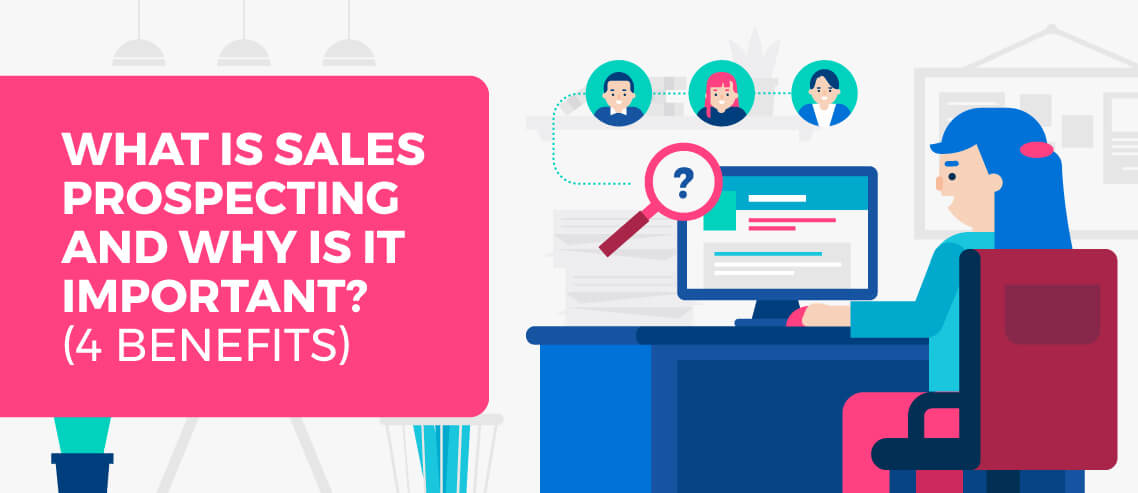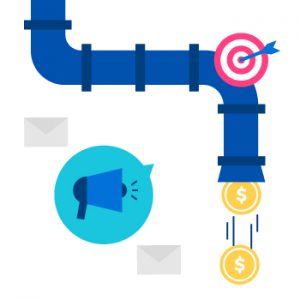What Is Sales Prospecting and Why Is It Important? (4 Benefits)

Contents
Thinking back on my 16-year career, I’m reminded of the smell of stale cigarette smoke and gum stuck on the bottom of a cubicle. As a 17-year-old in high school, I had no idea what sales prospecting was, but I liked the pay it brought. It was then that I learned how important this function was to the organization and why it should matter to yours.
What is sales prospecting? And why is it important?
Keep reading to find out.
Sales prospecting definition
So, what is sales prospecting anyways? Sales prospecting is the first stage of the sales process, focused on identifying potential customers and engaging them through cold email, cold calls, and other outreach efforts. The goal? To turn cold contacts into warm leads.
Why Sales Prospecting Is Important (4 Benefits)
To understand why sales prospecting is important, you need to understand the sales process and how people make buying decisions.
Let’s take a look at four primary reasons you need to master sales prospecting.
RELATED: The Modern Salesperson’s Guide to B2B Sales Prospecting in 2019
1. Pipeline

Sales prospecting is the lifeline that keeps your business growing.
“Pipeline is lifeline” is a saying that I keep top of mind each and every day I report into the office. Working for a SaaS company now, I sit within Marketing and I’m in command of our internal sales teams.
We develop pipeline in a variety of ways, but the main areas of focus for us are
- Our website “Contact Us” form
- Phone-in leads from those who contact our corporate number
- Our inside sales efforts contacting MQL’s (Marketing Qualified Leads) and other companies in our sweet spot
If you don’t have a way of building pipeline, your sales teams are going to struggle.
Pipeline is invaluable to business growth because it explains what has been achieved, what is in process, and who you are targeting. It also holds your team accountable to projections. Without pipeline, none of this can be achieved, and without documentation of efforts and targets, your business will have more questions than answers.
It’s important to start small, so work internally to understand who your ideal customer is, build out your personas, and commit to KPIs that can be measured, reviewed, and adjusted as needed.
RELATED: The 10 Golden Rules of Effective Sales Prospecting
2. Trusted Advisor
Being in sales prospecting is about much more than the title may indicate. In this role, you are a trusted advisor for the business you represent.
I loved becoming the SME (subject matter expert) on everything for clients, products, services, etc. Becoming an SME, though, is no easy task — and it’s not going to come overnight.
In addition to your prospecting efforts, you will need a focus on enablement and learning / development to keep your team sharp. If you’re not in the scaling process, don’t fret. You can have a frontline manager handle this until you can dedicate someone to a sales enablement function.
I remember getting countless callbacks from customers who had been with a product for years but would contact me back for trends, new findings, or even just to chat about their experience. They valued the personal touch I brought to their account and didn’t want that to go unnoticed. One business even wanted to send me a custom guitar; however, it would have been a violation of our contract with the client, so I had to respectfully decline.
Sales Prospecting allows your team to feel this, too. Each call, each email, each LinkedIn message is another stage for them to introduce themselves and provide value to the potential target.
3. Productivity

Having a sales prospecting team allows for an increase in productivity.
First, when you track the results of their prospecting efforts in a CRM, you can identify their strengths and weaknesses. This allows you to find inefficiencies and optimize efforts over time.
Be aware, there are many good CRMs out there. If your budget is tight, there are even free CRMs that work well until you can afford a more robust option that has advanced reporting and features.
Second, you need a system of measurement that gives your team a central place to access the leads you are going after — even if it’s an Excel spreadsheet. (Don’t everyone cringe at once! You need something to keep you and your team motivated.)
RELATED: The Complete List of Sales Prospecting Tools
When I was calling, I viewed my production as a game. This was before gamification was even thought of. If I made 40 calls in a day, the next day I would shoot for 50, and then 60, and so forth.
Finally, you need a Sales Prospecting plan in place. Aside from the gamification mentioned above, this helps you hone in on your target / ideal customer, so you aren’t spinning wheels on prospects who not only aren’t a fit but, quite frankly, don’t matter to your business.
That’s not to say there shouldn’t be a “holding pen” for those. As those of us in sales know, the year ebbs and flows at certain points, and supplemental work can be extremely valuable.
Getting your team focused on the accounts that matter pushes them to make more calls and send more emails, mailers, etc. I can personally attest to this: I was always more willing to contact someone who fit the ideal persona than someone whose contact information we did a Google search for and only hoped was accurate.
4. Competitive Insights
Sales Prospecting is an easy source of competitive insights.
These days, it rare to be the only option in your industry. Competition is stiff, and of course you want to know about the other brands your prospects are considering! The insights you gather from talking with your prospects can help you know precisely how to position your products and services.
I recommend creating play cards with your competitor’s advantages/disadvantages so your sales team is ready to speak to these points as they are come up in their sales discussions.
RELATED: How to Set Up a Winning Sales Cadence For Prospecting
It is important to note, it is in poor taste to “bash” or badmouth your competitors. Unfortunately, this was a lesson I learned the hard way. While selling financial services, I was quick to slander a top competitor, which immediately turned off my prospect. DO NOT BE THIS PERSON!
Instead, use the competitive insights you gather through sales prospecting to make your marketing campaigns more effective.
As I write this, we are running two campaigns based off of competitive software. We took our findings and compiled a set of video mailers, complete with complimentary coffee mugs and coffee. The offer? To have a virtual cup of coffee with us.
We are still in early stages of this, but it has drawn a lot of positive attention within our business and the prospects are grateful for the gesture that we extended to them.
Bottom Line
Sales prospecting is vital to your businesses’ success. Not only does it keep your pipeline full, it positions you as a trusted advisor, boosts productivity, and gives you unique competitive insights.
Your pipeline is your lifeline. And sales prospecting is your best bet for keeping it healthy.





